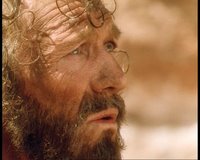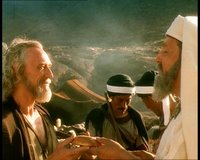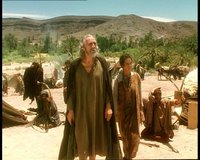Abraham (1994)
 Abraham was the first film produced by Lorenzo Minoli, back in 1994, as part of what would become the Bible Collection. Eventually it led to 12 other films being made which were based on stories from the Old and New Testaments, as well as an additional 4 stories fictionalising the lives of those who were "close to Jesus".
Abraham was the first film produced by Lorenzo Minoli, back in 1994, as part of what would become the Bible Collection. Eventually it led to 12 other films being made which were based on stories from the Old and New Testaments, as well as an additional 4 stories fictionalising the lives of those who were "close to Jesus".It was an auspicious start. Abraham has generally been neglected in film, with only a handful of portrayals over the 110 or so years the cinematic medium has been around. Director Joseph Sargent's (most well known for Jaws: The Revenge) acquisition of Richard Harris and Barbara Hershey (just five years after Last Temptation of Christ) to play his leads must have been a major triumph. Sargent himself shows far more ability here than in his dead-in-the-water shark flick, with interesting camera angles and use of light, most notably when the newly enlightened Abram tells his father (still in the dark) that he must leave (see below right).
 There is some great work by a number of other members of the team on display here as well. The score, by Ennio Morricone (The Mission and numerous other films from the Bible Collection) subtly underpins much of what we see and hear. Raffaele Mertes shimmering cinematography makes the desert feel relentless and frustrating, such that there's a tangible sense of release whenever Abraham's people find water and food.
There is some great work by a number of other members of the team on display here as well. The score, by Ennio Morricone (The Mission and numerous other films from the Bible Collection) subtly underpins much of what we see and hear. Raffaele Mertes shimmering cinematography makes the desert feel relentless and frustrating, such that there's a tangible sense of release whenever Abraham's people find water and food. As a group of films, the Bible Collection had three major strengths. Firstly, they tried to stress the historical context around the stories. This is somewhat unevenly achieved here, the opening scenes which include Lot's wife giving birth, covenants being broken and made, and the huge cohort that follow Abram around, certainly flesh out some of the background to this narrative. The film nicely captures the nothingness of Abram's life before God. His god was simply unknown to people prior to his call to Abram in Genesis 12.
 That said, as the film progresses the histoircal strengths of the film seems to fade a little. For example, there is indication that Abraham lived in a culture where child sacrifice was not uncommon. This certainly changes the impact of the text somewhat, which never indicates an angsty reluctance on Abraham's part. Removing the story from this context, and portraying Abraham as a proto-21st century father is, of course, very common, but it politicises the text into form easily manipulated by preachers. "Do you love God enough to sacrifice the things you hold most dear"? It's an important question of course, but the story can be read in other ways.
That said, as the film progresses the histoircal strengths of the film seems to fade a little. For example, there is indication that Abraham lived in a culture where child sacrifice was not uncommon. This certainly changes the impact of the text somewhat, which never indicates an angsty reluctance on Abraham's part. Removing the story from this context, and portraying Abraham as a proto-21st century father is, of course, very common, but it politicises the text into form easily manipulated by preachers. "Do you love God enough to sacrifice the things you hold most dear"? It's an important question of course, but the story can be read in other ways.Secondly, they have tried to include episodes that many bible films gloss over. Here, for example, Abraham does lie to the King of Egypt, even though here the story is spun to show that Abram needed to do this in order to save his starving, thirsty people. We also meet Melchizedek (below right), priest and king of Salem. It's important that such episodes are included in these stories, and script writer Robert McKee has worked hard to maintain the audience's empathy with Abraham, postulating plausible back stories to justify Abraham's actions.
 Finally the Bible Collection films have tried to flesh out the characters involved in the stories, using a combination of extra-biblical historical sources, speculation, and good old imagination. Sometimes this has not been so successful, but here, for example, the way that the background figure of Eliezer of Damascus (Genesis 15:2) is brought into the story in such a way to explain his otherwise mysterious biblical credit is intriguing. The closing line, about Ishmael and Isaac (that "on his tomb they joined hands") seemingly based on a line in Josephus.
Finally the Bible Collection films have tried to flesh out the characters involved in the stories, using a combination of extra-biblical historical sources, speculation, and good old imagination. Sometimes this has not been so successful, but here, for example, the way that the background figure of Eliezer of Damascus (Genesis 15:2) is brought into the story in such a way to explain his otherwise mysterious biblical credit is intriguing. The closing line, about Ishmael and Isaac (that "on his tomb they joined hands") seemingly based on a line in Josephus. The relationship between Hagar and Sarai (and later Abraham) is also interestingly developed, although Hagar is painted badly so it's easy not to sympathise with her when Abraham sends her and Ishmael away. Overall the film meanders it's way through the first half of the film, taking time to explore, and familiarise itself with, its characters before putting them under the microscope of the events that occurred to them.
 Arguably the most memorable passage from the various stories of Abraham and Lot is his aborted attempt to sacrifice Isaac. This forms the pinnacle of this film that the rest of it builds towards. Whereas Genesis continues to look at how Abraham arranges Isaac's marriage, buries Sarah, and marries Keturah, this film climaxes with God's timely intervention. The narrative has flowed surely but steadily towards such a climax. Abraham and Sarah's desperation for a son through the first three-quarters of the film is unrelenting. Several of the transitions between the various episodes show Abraham alone, burning various sacrifices to his god. On one occasion we even see Abraham teaching Ishmael about sacrifice in a way that hauntingly pre-figures Abraham's near sacrifice of that held most dear to him.
Arguably the most memorable passage from the various stories of Abraham and Lot is his aborted attempt to sacrifice Isaac. This forms the pinnacle of this film that the rest of it builds towards. Whereas Genesis continues to look at how Abraham arranges Isaac's marriage, buries Sarah, and marries Keturah, this film climaxes with God's timely intervention. The narrative has flowed surely but steadily towards such a climax. Abraham and Sarah's desperation for a son through the first three-quarters of the film is unrelenting. Several of the transitions between the various episodes show Abraham alone, burning various sacrifices to his god. On one occasion we even see Abraham teaching Ishmael about sacrifice in a way that hauntingly pre-figures Abraham's near sacrifice of that held most dear to him.Perhaps the weakest are of the film are the battle scenes, which feel a little drawn out, and disrupt the rhythm of the film. Whilst the film pre-dates Braveheart and the revival of the epic film, and so cannot be called for being yet another copycat job, it still seems to lack the necessary tension to make them interesting. These scenes never seem to carry any sense of danger.
Overall though, Abraham is a worthy telling of the life of the father of the three great monotheistic faiths, finding both strength and weakness in it's lead character, and providing much of the context that surrounded him.
Labels: Abraham, Bible Collection (The)














4 Comments:
At 11:05 pm, May 12, 2006, Peter T Chattaway said…
Peter T Chattaway said…
FWIW, I don't think this was the first film in the 'Bible Collection' series -- that would probably be Ermanno Olmi's Genesis: The Creation and the Flood. However, Abraham was the first in the series to follow a conventional dramatic format, and the first to be broadcast on American networks, so it is probably the first film in the series that many people encountered.
At 2:48 pm, May 15, 2006, Matt Page said…
Matt Page said…
Thanks Peter
Both films are listed at the IMDB as 1994, but it appears both should actually be dated in 1993 - certainly that's the date given for Abraham on the producer's Five Mile River website's chronology.
Matt
At 10:01 am, May 20, 2006, WitlessD said…
WitlessD said…
The TV film "Abramo" was first shown on Italian TV on 12 & 13 December 1993, so 1993 is cetainly correct.
Olmi's film does not appear to have been made before this one. It was originally conceived as a theatrical film (it's the only one of the series to appear in the ANICA webside) and was first shown on 16 September 1994. Only subsequently was it "co-opted" and shown on TV as part of the series.
At 5:58 pm, May 22, 2006, Matt Page said…
Matt Page said…
Ah, that explains why Lorenzo Minoli isn't counted as a producer for this film. Thanks.
Matt
Post a Comment
<< Home